Domain Names And SEO: What Should Bloggers Know

Are you planning to start a new blog?
Or are you considering a re-brand for your current site?
Whether you are looking to invest in a new domain or thinking how domain metrics should impact your marketing decisions, here’s a quick overview of what bloggers should know about domain names and SEO.
Does your domain name impact your organic search visibility?
The short answer is: Yes.
The long answer is: It is no longer the powerful search algorithm signal it used to be about ten years ago but there are still direct and indirect factors your domain name can contribute to your organic search visibility.
Let’s review all those direct and indirect factors:
Keywords in the domain name
Keywords used to be a major ranking factor: It used to take a few weeks for a domain to rank for its exact-match keywords. It is no longer that direct or easy, even though SEO-aware webmasters have a hard time leaving that tactic behind.
Based on my own observations, keywords in a domain name matter no more than keywords in a URL. To put it in a different way, you can invest in a keyword-focused domain name but have the same result by simply creating a new page that would have those keywords in its URL.
Keywords in a domain name may still be useful:
- For creating instant topical associations with your brand
- For getting some extra clicks from people who will see that keyword within Google SERPs (more on this below)
How does it apply to your SEO strategy?
Now that keywords in a domain name don’t matter that much anymore, you don’t need your exact-match keyword in your domain to create niche associations. You can go with synonyms or related concepts. For example, if “fashion” is your main keyword, you can do well with “style” or even “fancy”.
To help you brainstorm all those words that you can use to find a cool and relevant domain, try Text Optimizer, a semantic research tool allowing you to find underlying and related concepts:
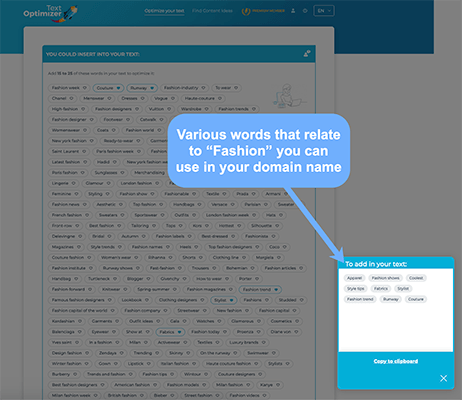
Domain name clickability
Clickability is a temporal factor, i.e. if your search listing gets actively clicked, it will climb up to a higher position, but only for a few days. This has been tested and proven lots of time. We know that it works and we know that inflating click-through is pretty useless as you will lose those higher rankings as soon as those clicks slow down.
What is much more important is:
- Consistent click-through rate which is a bit higher than that of your organic neighbors
- Meaningful on-page engagement after a click from organic search
While your domain cannot help you with the second signal, it can very well impact your organic click-through as your domain name (as we as your logo) is part of organic search engine result page:
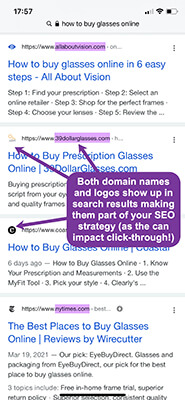
That being said, your domain name should create positive topical associations and be catchy enough to get some clicks. If you invest time and effort in your branding, with time your domain will also be more recognized and bring in even more clicks. For example, I always scroll through results until I see a blog name I know. I am sure many people do the same.
So choosing a domain name that is easy to remember and quick to recognize is always a good idea.
From there, all that matters is on-page engagement that has nothing to do with your domain name. We know Google is paying attention to on-page engagement because if you go back to search results too fast, Google knows you didn’t find what you were looking for and it will try to help you out:
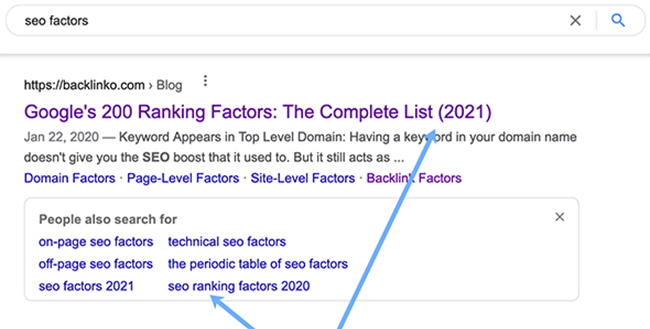
How does it apply to your SEO strategy?
Improving your on-page engagement is much more important than getting more clicks.
Make sure to make the most of each click: Come up with additional on-page engagement methods to get those people to interact with your site. These may include anything from installing exit popups and web push notifications to using live chats. Both of these methods use personalization to hold your page visitors and encourage them to continue their journey through your site.
If you sell services, you can invite people to schedule a call with you right away with Appointfix or let them record a voice message using SpeakPipe. Diversifying your CTAs is a good way to improve your conversions:

Here’s also a good guide on optimizing your page for and conversions.
Using tools like Finteza you can identify how each page is doing a better job engaging your site users:
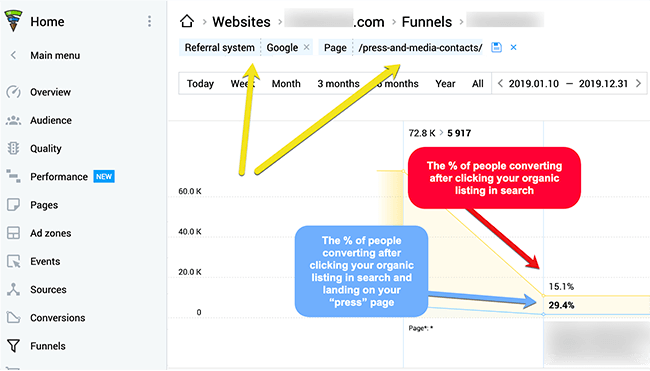
Top-level domains
Top-level domain is the last segment of a domain name, it is basically what you see after the dot. Top-level domains have been a source of constant SEO theories and assumptions (and frankly, myths). These include:
- Google favors .com domains
- Google assigns more power to backlinks pointing to your site based on which top-level domains they are coming from
It is time that we leave both of these theories behind.
How does it apply to your SEO strategy?
The only times a top-level domain matters are:
- When you have a local domain name (Google would serve local domains mostly in the location it refers to. For example, if you search in the UK, Google will likely give preference to co.uk domains)
- When a .gov site is linking it. This might be a correlation matter rather than causation: .gov sites just have more backlinks and trust, but I know for a fact that if you get a link from a .gov page, your rankings grow.
In all other cases, a top-level domain doesn’t matter. On the contrary, it may be time that we look at alternative top-level domains because you will be able to snatch a cool brand name that is still available. Namify is a cool tool to use for that:
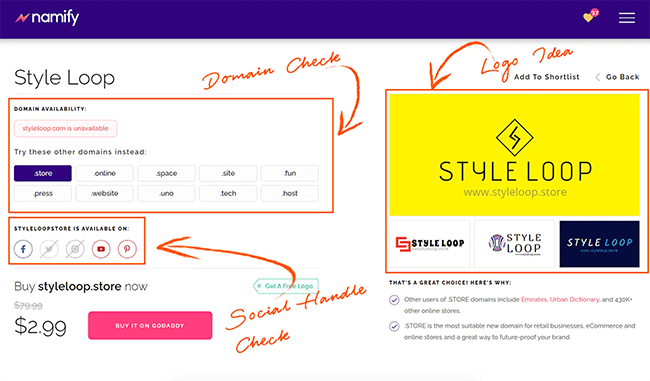
Namify uses artificial intelligence to generate brand names that contain your keyword and creates cool niche associations.
Domain age
Finally, domain age is another factor that is often discussed by website owners. If you are considering to invest in a domain name that was previously used, here’s what you should know:
- Domain age doesn’t matter as much as its history: Stay away from domains that may have some negative history (questionable links pointing to that domain and consequent penalties that may carry over to your site)
- Domain age is not as important as the site age, i.e. when Google first discovered that site. This is what Google is showing in search results now:
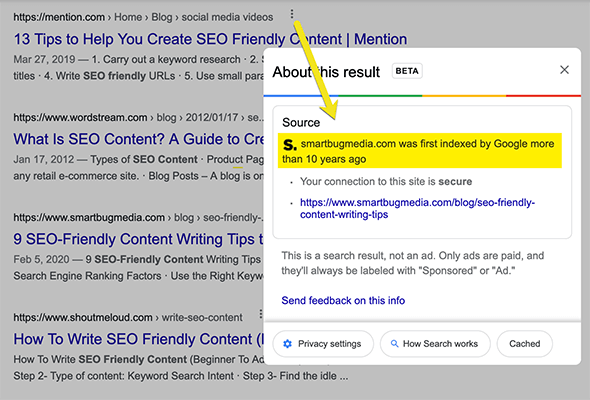
If you read Google’s Quality Guidelines, you will notice that a “domain name” is almost never mentioned. Google talks about the site age and authority but never a domain name.
With that said, if you are buying a domain name based on its age, it is not a very smart investment.
How does it apply to your SEO strategy?
If you consider buying an existing domain, check Ahrefs for any traffic or rankings dips or declines which could signal a potential penalty which may be difficult to shake off.
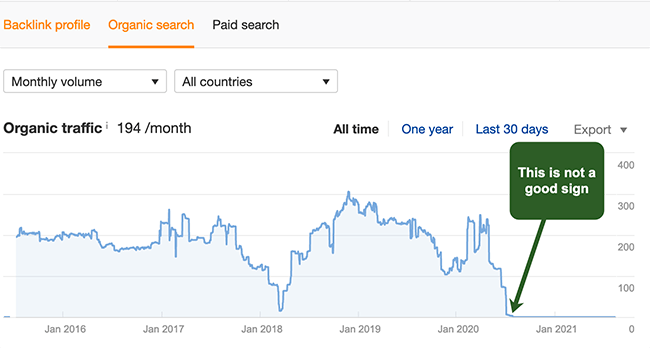
Domain authority
Put simply, domain authority doesn’t exist.
SEO tools may use it to grade websites but Google isn’t using it for anything which Googlers confirmed time and again.
Google is using backlinks to assign authority to a web page (which is one of many ranking factors).
The home page of the site usually has the highest authority because ALL pages of the site are linking to it.
How does it apply to your SEO strategy?
When you are building links or analyzing your current backlinks, top-level domains shouldn’t actually be part of your strategy. They hardly matter at all. What you really need to focus on is whether those backlinks send traffic as well as whether they are indexed and/or cached by Google. Link Checker is a cool tool that can help you with both:
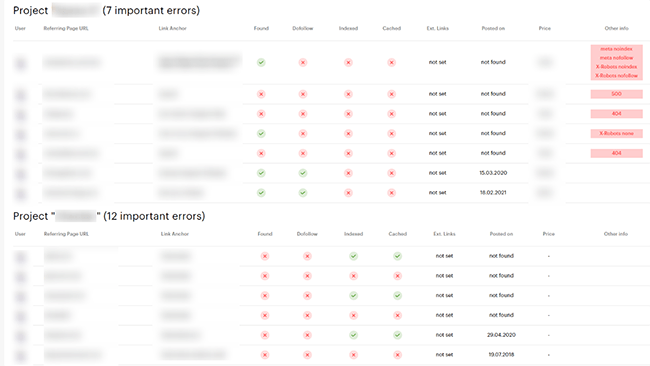
TLDR: Domain names and SEO
- Keywords in a domain name don’t matter as much as they used to but they are helpful in creating topical associations.
- Keywords in a domain name may improve your organic click-through but on-page factors are much more important, so better focus on those.
- Don’t stress over finding a .com domain. Any other top-level domain (except for local ones) will do as well, SEO-wise.
- Don’t invest in a domain for its “age”. Domain age is no metric but an old domain could potentially do harm as it may carry over past penalties.
- Domain authority doesn’t exist! Just leave this metric behind. If you need to a metric to evaluate site’s quality, use its traffic, as per Ahrefs, Alexa or SimilarWeb.
And that wraps up our guide to domain names and SEO. Need help choosing the right domain name? Or starting your blog? Check out these guides:
